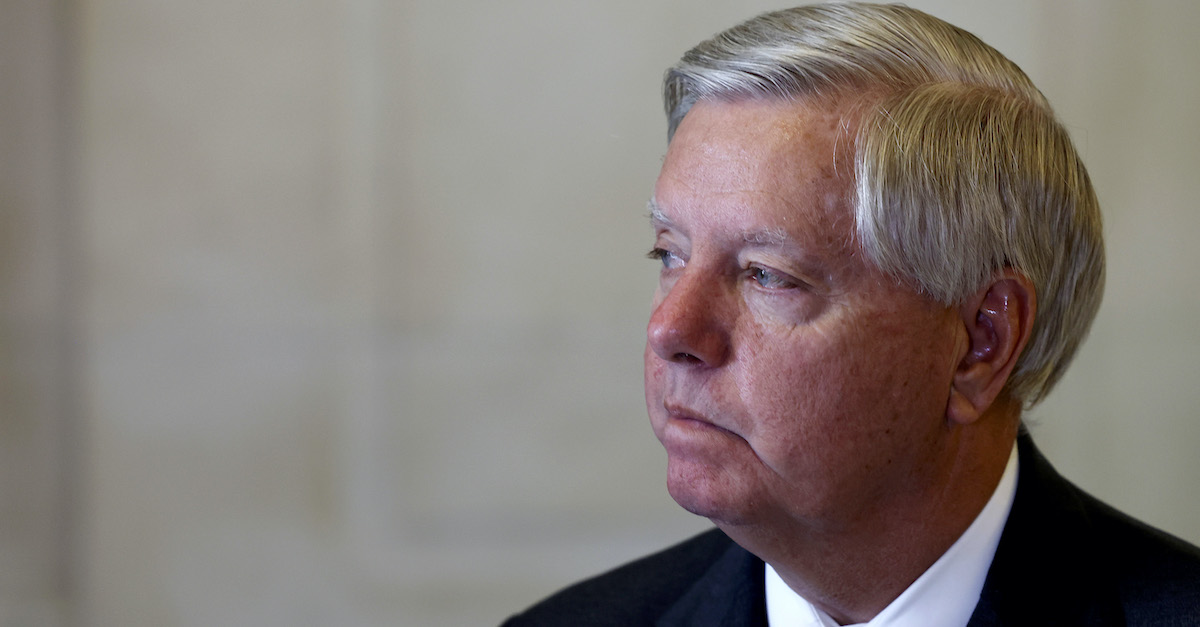
Sen. Lindsey Graham (R-S.C.)
A federal appeals court temporarily put a subpoena on hold Sunday, giving Senator Lindsey Graham (R-S.C.) more time to present a fully developed argument that he should not have to give testimony in an investigation about his knowledge of or potential involvement in efforts to interfere with the 2020 election.
Georgia investigators have said they seek to question Graham about phone calls he had with Georgia election officials in late 2020, around the same time that former President Donald Trump’s infamous “find 11,780 votes” call with Georgia Secretary of State Brad Raffensperger (R) took place. Graham is said to have made at least two calls to Raffensperger and members of his staff in the weeks immediately after the election.
Graham has argued that both the concept of sovereign immunity and the U.S. Constitution’s Speech or Debate Clause renders him “immune” from subpoenas, because the clause states that members of Congress “shall not be questioned in any other place.”
A special purpose grand jury in Fulton County, Georgia subpoenaed Graham in late July, thereby requiring Graham to comply with District Attorney Fani Willis’ (D) investigation into election interference.
Graham next retained Trump’s former White House counsel Don McGahn to challenge the grand jury’s subpoena. In court filings, Graham argued through counsel that “being forced to testify in front of a state-court investigative body” would raise “constitutional issues that the Framers thought were ‘indispensably necessary[]’ to a functioning Republic—namely, that legislators ‘should enjoy the fullest liberty of speech, and that [they] should be protected from the resentment of every one, however powerful, to whom the exercise of that liberty may occasion offense.'”
Graham’s arguments failed to convince U.S. District Judge Leigh Martin May, who ruled that neither sovereign immunity nor the Speech or Debate Clause operate to shield Graham from the subpoena. May, a Barack Obama appointee, further ruled that Willis “has shown extraordinary circumstances and a special need for Senator Graham’s testimony on issues relating to alleged attempts to influence or disrupt the lawful administration of Georgia’s 2022 elections.”
May wrote that “Senator Graham has unique personal knowledge about the substance and circumstances of the phone calls with Georgia election officials, as well as the logistics of setting them up and his actions afterward.”
Graham appealed May’s ruling to the 11th Circuit. A three-judge panel made up of U.S. Circuit Judges Kevin Newsom and Britt Grant (both Trump appointees) and U.S. Circuit Judge Charles Wilson (a Bill Clinton appointee) ruled Sunday to temporarily stay May’s August 15 order.
The brief 14-line order simply put the matter on hold while the parties were directed to brief the issue of what protections might be afforded to Graham by the Speech or Debate Clause before the district court.
The panel’s specific wording, however, appears to contain an indication of the court’s position on Graham’s claim of outright immunity. The court wrote that, “This case is REMANDED to the district court for the limited purpose of allowing the district court to determine whether Appellant is entitled to a partial quashal or modification of the subpoena to appear before the special purpose grand jury.”
Several pointed out that the 11th Circuit indicated that a “partial quashal or modificiation of the subpoena” was all that was on the table.
In a tweet reacting to the news, Norm Eisen called the ruling “a loss for Lindsey Graham” that was “looking bad for him.”
Former U.S. Attorney Harry Litman called the stay “odd” in a tweet, and pointed out that Graham only applied for a full quashing of the subpoena.
Likewise, law professor Kimberly Wehle tweeted that the ruling seems “bad for Graham because it leapfrogs over his appeal on total immunity.”
Despite the 11th Circuit’s signals that any protection for Graham would be limited in scope, some were still critical of the court’s action nonetheless.
Constitutional law professor Anthony Michael Kreis tweeted that the court is “throwing a wrench into a criminal investigation.”
Likewise, former U.S. Attorney and NBC/MSNBC legal analyst Joyce White Vance said that the ruling “significantly delays Fani Willis’ ability to take Lindsey Graham’s testimony,” and that the delay “could be months, not weeks.”
It didn’t take long for the district court to respond and set deadlines, however.